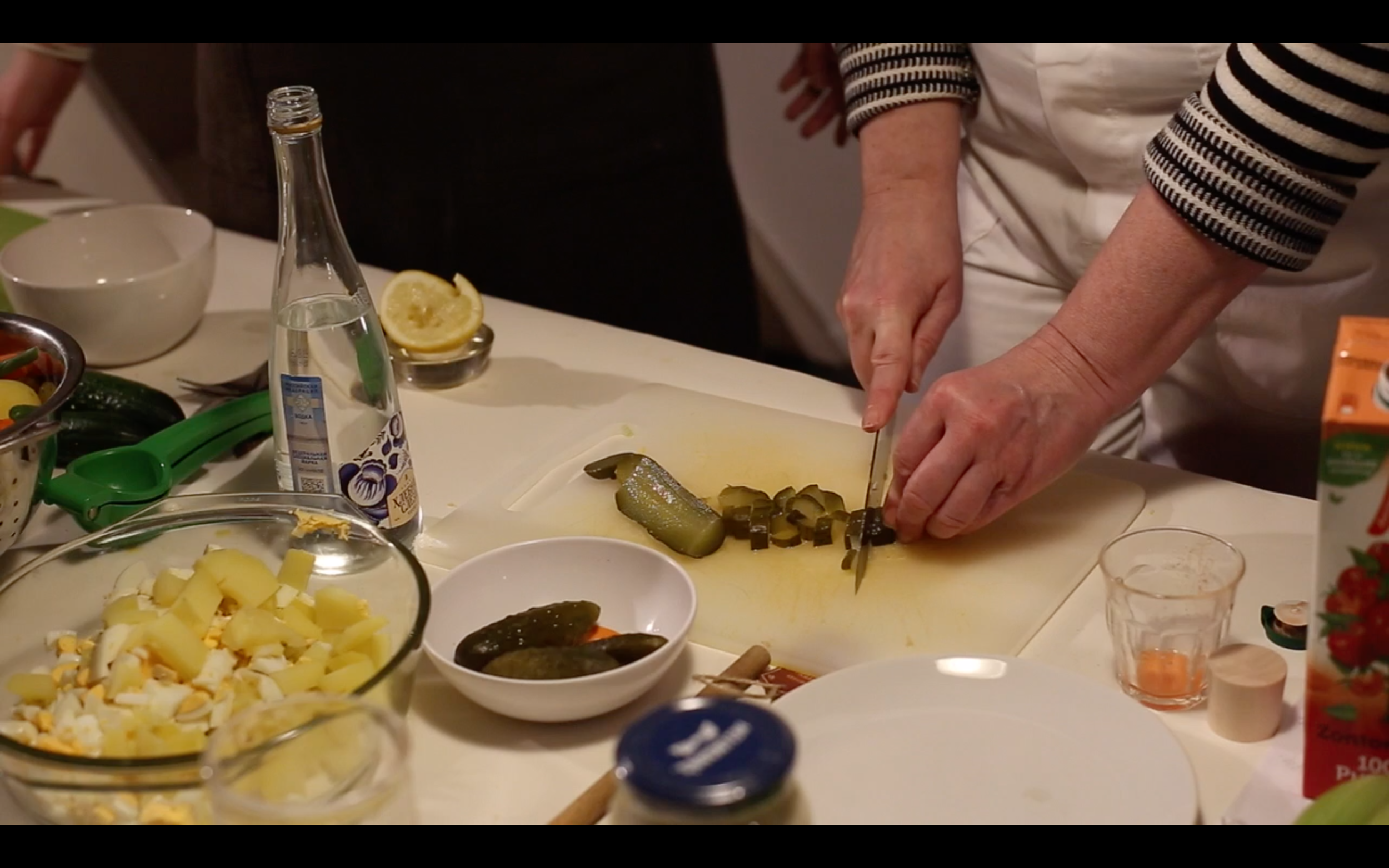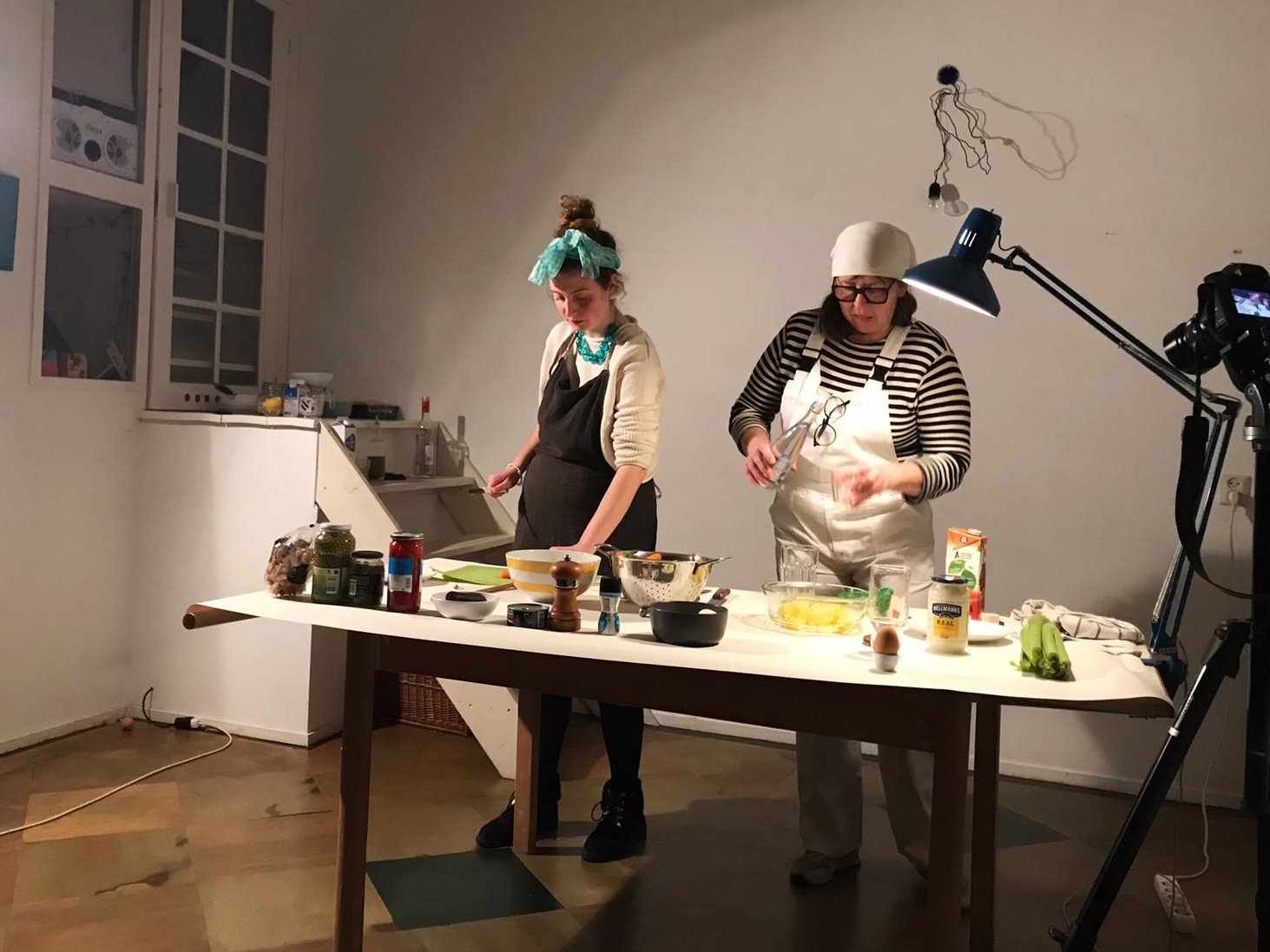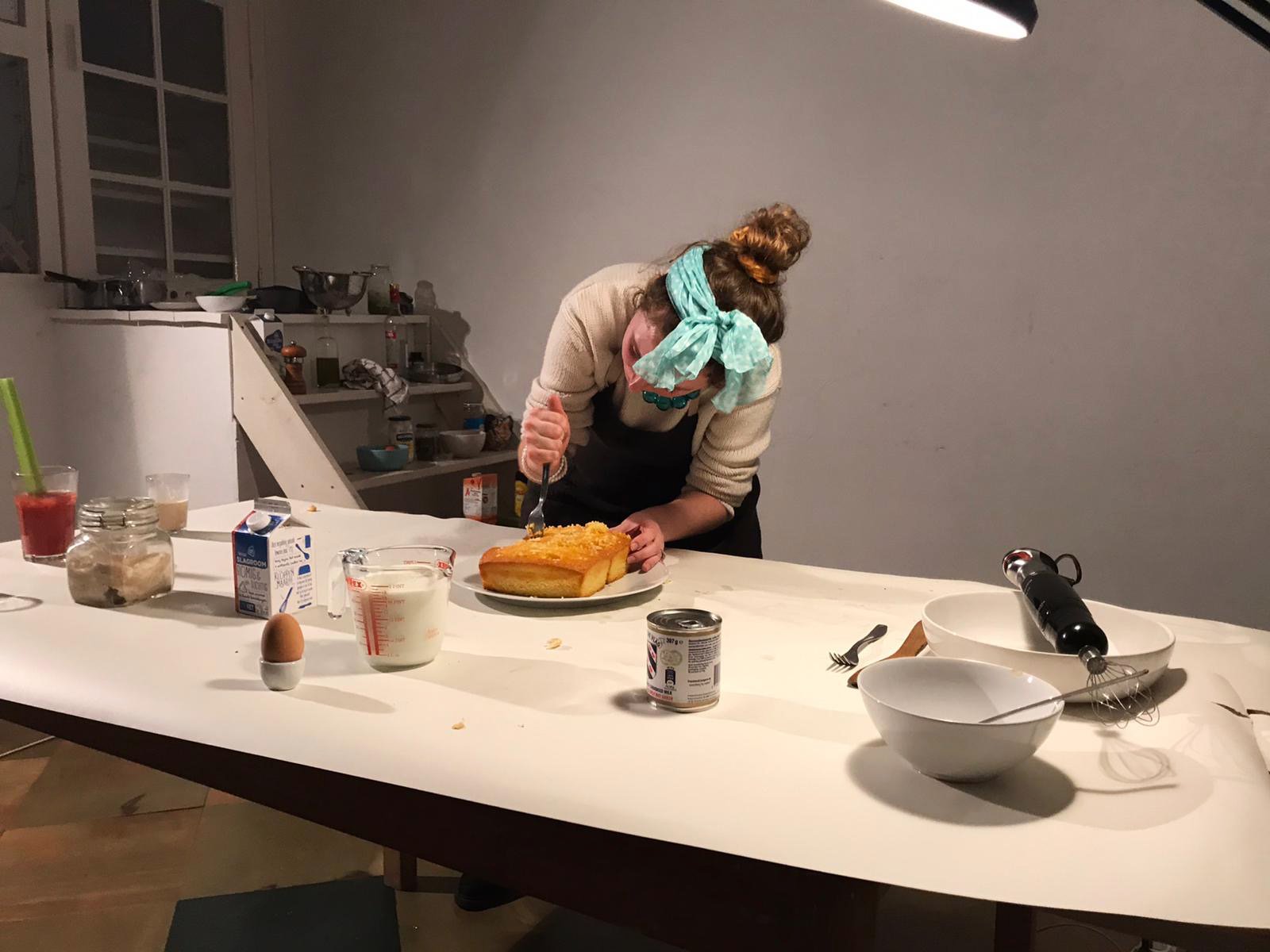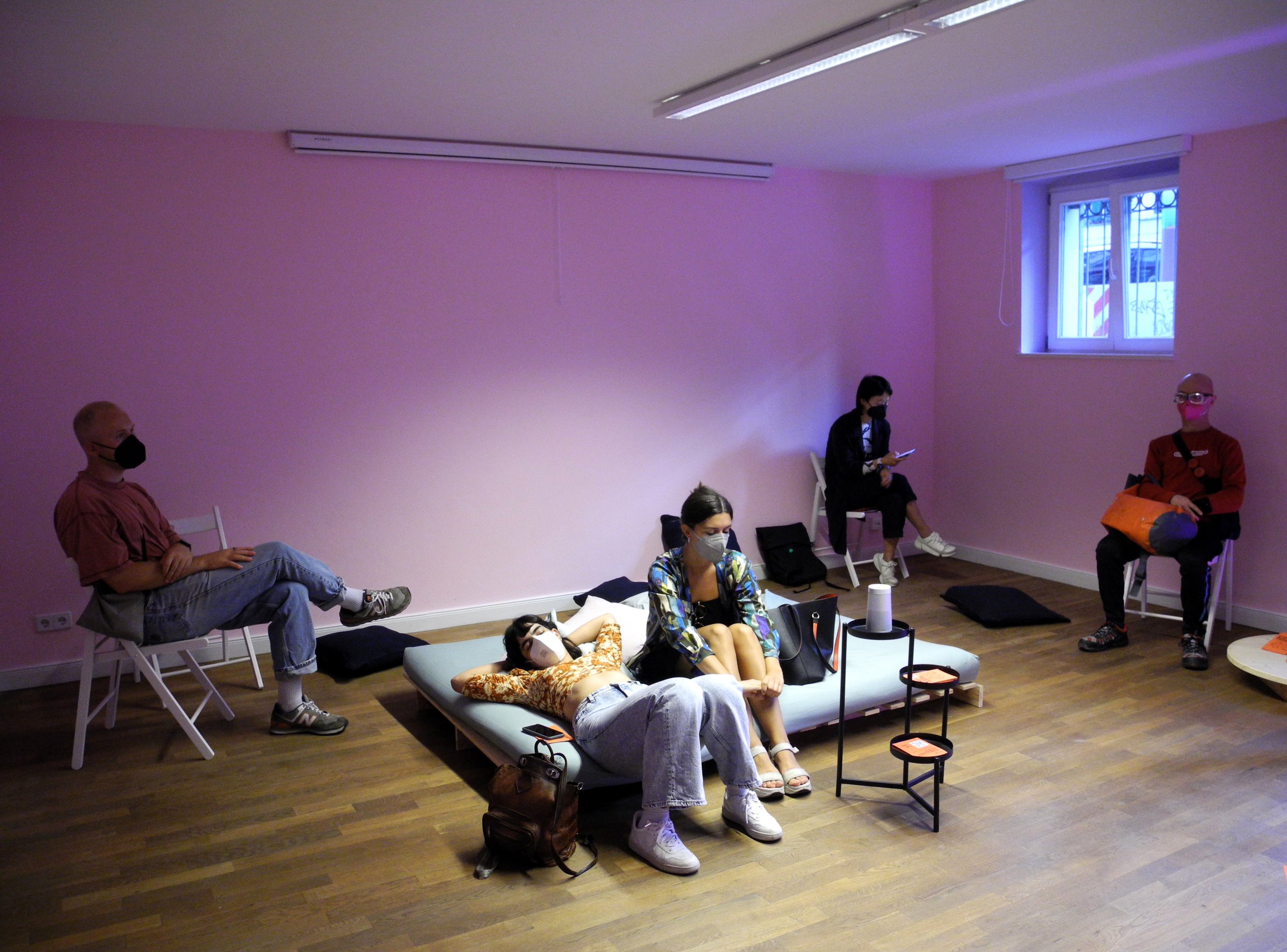IMBISS
IMBISS is a research group that thinks food as that which is simultaneously life sustenance, a cultural ecosystem and a political product. The research looks at the intersections between eating practices, culinary histories, food production and trade, and global politics. The group has been existing since 2020 under the intermittent assembly of Hannah O’Flynn and Vita Buivid, and currently takes form within the framework of with the rubbles of old palaces. IMBISS works as an umbrella for different lines of research and practice, as well as a holding place for collaboration.
The Cooking Show: Food Politics -- Mayonnaise Edition
The Cooking Show: Food Politics — Mayonnaise Edition was a performance in the form of a cooking show that looked at different white foods, their histories and given symbolic values. Special apparitions were: mayonnaise, the disputed history of russian salad, the controversial white and black russian cocktail, and a parody of the construction of white innocence through a tres leches baking tutorial. Performing were Vita Buivid, Hannah O’Flynn, Giorgos Gripeos, Flávia Palladino and Francisco Mojica. The performance was part of Night Seminars, a performance series organised by Vita Buivid, Francisco Mojica, Giorgos Gripeos and Maxime Gourdon.
All images are by Giorgos Gripeos and Francisco Mojica.
“El pan de cada día” — Colonial Histories of the Baguette
This investigation, developed by Hannah O’Flynn within the IMBISS Research Group, opens the question of the relation of the colonial/imperialist project with food production, and the shift of whole ecosystems due to the exploitative capitalistic approach to farming and food trade. This research attempts to map the intersecting capitalist, imperialist and colonial histories of such an everyday food item as the baguette. Why does the baguette appear in so many of the historical French colonial contexts, and why is it so popular? What exactly is the relation between the baguette and the French colonial project? If wheat crops are not indigenous of many of the areas where the baguette is widely consumed, and wheat is impossible to grow in some of these climates, what exactly are the economic forces behind its expansion in many of these markets?
The project begins looking at wheat and wheat bread’s symbolic and ecologic significance in the Spanish colonisation of the Americas, and its role in the construction of race and the forced conversion of the population into Catholicism. The research into wheat then develops into a specific wheat bread, the baguette, which, being introduced by Napoleon during the French Revolution, was to become an emblematic food product of the Industrial Revolution, and the bread of a growing urban working class. The baguette, having become a French cultural emblem, begins to appear across urban centres of many of the old French colonies. This research therefore continues by questioning its dominance in contexts where wheat is not an indigenous crop, therefore looking at wheat’s current role in imperialist economics and its crucial role in the maintenance of uneven geographical development. This, of course, clearly traces the relations between the colonial and imperialist projects, capital, food production, the environmental change caused by the introduction of invasive crops into colonised environments, and the environmental costs of the trade of such products for the sake of continued capital accumulation by the capitalist centres.
How (LITE) Are You?
In Vita Buivid's lecture, How (LITE) Are You?, she analyses the relationships between the body and the state by looking at the manipulation of food regulation by authorities as a form of oppression. Famine in Ukraine in 1932-1933 (Holodomor) has been recognized by historians as Red Terror and as the genocide of the Ukrainian population. Vita unpacks this historical event through her family’s narrative and generational trauma, presenting the personal as the political and outlining the relationship throughout her life of her body with state governance.
The second part of the performance looks to answer the question of (LIGHTNESS) by thinking drunkenness. This is done by visualising a feminist approach to woman’s position in contemporary society in terms of alcohol consumption, as well as questioning the causes and the results of the drinking process.
This was a lecture-performance by Vita Buivid within the framework of the Dutch Art Institute, with documentation by Silvia Ulloa.
The Critical Drinking Curriculum
The Critical Drinking Curriculum is a public program coordinated by Hannah O’Flynn and Vita Buivid under the politics of food research group IMBISS. The program takes the form of a series of public events that look at alcohol as a political substance, as well a place of intersection for the relationship between the body and the State. The curriculum thinks this history from the scope of race, gender, class and age, between others. It considers how the historical production, trade and consumption of alcohol, together with the cultural codes surrounding these practices, entangle themselves with global politics. The public program opens up this entanglement by doing an artistic enquiry into some of the different histories of alcohol production, trade and drinking. The program will make public appearance in the forms of a pop up bar, performances, an exhibition, lectures, a podcast, a publication, film screenings, round tables or a supper club.
(Poster image is Bacchus by Michelangelo Merisi da Caravaggio)
SMASHED:
Speaking Histories of Insurrection
“SMASHED: Speaking Histories of Insurrection” will be showing an audio piece by Hannah O’Flynn that forms part of “The Critical Drinking Curriculum”, a series co-curated by Vita Buivid and Hannah O’Flynn on the political history of alcohol. The piece enquires into the Irish pub as a political space for community building, transmission of oral history and anti-colonial organising within the context of the long British colonial occupation of Ireland.
The work shown is a sonic collage of conversations with Michelle Turley, Pádraigín O’Flynn, Ian Nolan and Niall O’Flynn on the space created around the practice of collective drinking, and its relation to the disavowal of and organisation against an oppressive colonial regime. The research on the collective memories of Ireland’s colonisation and resistance is approached through storytelling and the re-telling of personal and family histories deeply entrenched in this history.
The space of the pub becomes the prism into this research due to drunkenness’ close relationship to the transmission of oral history. This is of particular importance in the Irish context due to its long history under colonial rule, where official written history was controlled by the British — drunk oral history becoming, thus, a possible space for insurgency.
What place does the pub occupy within the social fabric? In what ways can the pub be a space of learning? How do the voices of the oppressed move through and around a system of violent silencing? In what ways does drunk speech escape discipline? What are the ways in which one listens? What does contagious singing have to do with collective political activation? Is there a direct relation between higher alcohol consumption and political despair?
An audio installation by Hannah O’Flynn interviewingMichelle Turley, Pádraigín O’Flynn, Ian Nolan & Niall O'FlynnSound post-production by Pablo Giménez ArteagaExhibited within the Project Space Festival 22











